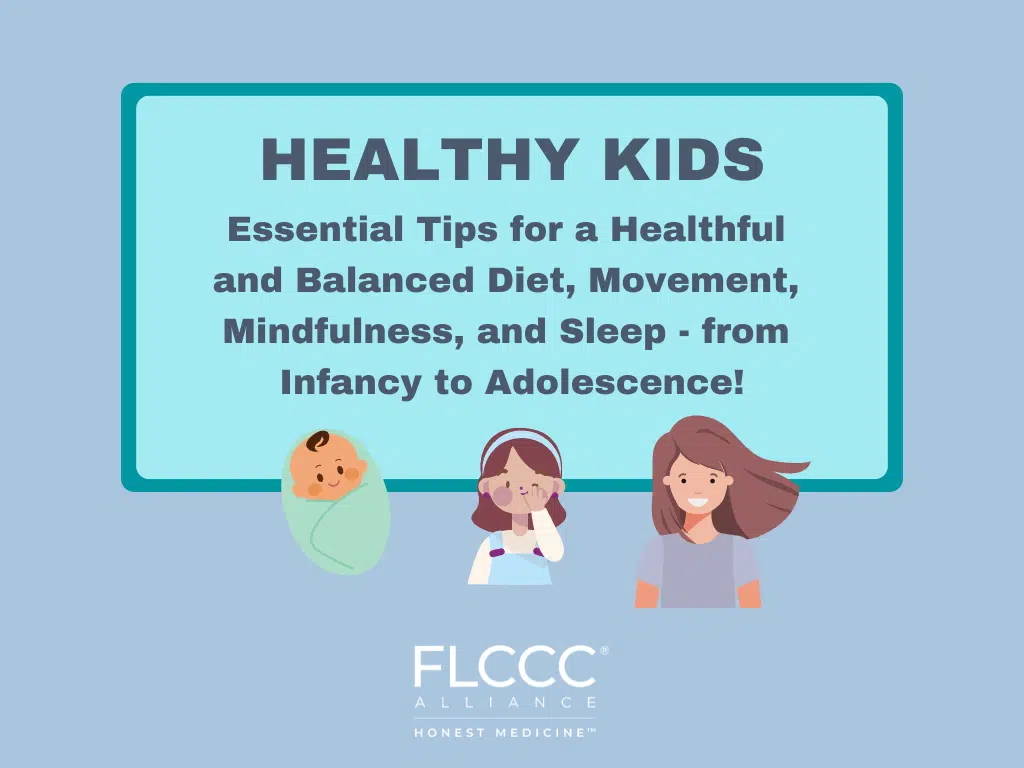Discover the best ways for parents and families to instill healthy habits in kids. Let’s learn how to help kids build good habits to stay strong + resilient.

Are you looking for a guide to help your child build some healthy habits? Whether you’re a new parent or have older kids, establishing and maintaining healthy routines is crucial at every stage of childhood. This guide provides essential tips on nutrition, physical activity, sleep, and mindfulness, tailored to each age group from infancy, children and teens, through adolescence.
Building healthy habits in kids has always been important, helping them grow strong and stay happy. This guide focuses on easy, everyday ways to ensure your child’s well-being and support their development at any age.
Ready to get started? Click the image or link below to download the PDF guide now! Or, keep reading for some quick tips to keep your kids healthy and happy 🧒🍎
Healthy Habits for Infants
Establishing healthy habits starts with you!
- Skin-to-Skin Contact: Promotes bonding, regulates baby’s temperature, and supports breastfeeding.
- Safe Sleep Practices: Place baby on their back to sleep, use a firm mattress, and keep the crib free of loose bedding and toys.
- Tummy Time: Strengthens neck and shoulder muscles, prevents flat spots on the head.
- Hydration: Breast milk or formula is sufficient for hydration; avoid water and juice before six months.
- Balanced Nutrition: Easily digestible proteins, essential fats for brain and eye development, carbohydrates for calcium absorption, vitamins, minerals, antibodies, and enzymes for immunity and digestion.

Healthy Habits for Children (2-12 Years)
Balanced Diet and Healthy Eating
A balanced diet fuels a child’s growth and energy. Offer a variety of fruits, vegetables, whole grains, proteins, and healthy fats to support optimal development and health.
Physical Activities
Regular physical activity is crucial for children’s physical and mental health. Encourage at least 60 minutes of play and exercise daily to boost fitness, coordination, and mood.
Mindfulness
Mindfulness helps children manage stress and improve focus. Simple practices like deep breathing and short meditations can enhance emotional well-being and concentration.
Ensuring Enough Sleep
Adequate sleep is vital for children’s growth and brain development.

Healthy Habits for Adolescents (12-18 Years)
Balanced Diet for Adolescents
A balanced diet is essential for adolescents, as it supports the rapid physical and mental growth occurring during these formative years. Proper nutrition helps fuel the body, maintain energy levels, support healthy brain function, and promote optimal development. A balanced diet for teens includes a variety of foods that provide essential nutrients:
- Fruits and Vegetables: These should make up a significant portion of a teen’s diet, offering vitamins, minerals, and fiber. Aim for a colorful variety to ensure a range of nutrients.
- Whole Grains: Foods like whole wheat bread, brown rice, quinoa, and oats provide energy and important nutrients like fiber, B vitamins, and minerals.
- Protein: Essential for growth and muscle development, good sources include lean meats, poultry, fish, eggs, beans, lentils, nuts, and seeds. Incorporating plant-based proteins can offer additional health benefits.
- Dairy or Dairy Alternatives: Important for bone health, options include milk, yogurt, cheese, and fortified plant-based alternatives like almond or soy milk. These provide calcium, vitamin D, and protein.
- Healthy Fats: Necessary for brain development and overall health, include sources like avocados, nuts, seeds, olive oil, and fatty fish such as salmon.
- Hydration: Water should be the primary beverage of choice. Adolescents should limit sugary drinks and caffeine, opting instead for water, herbal teas, and milk or milk alternatives.
Common Nutrient Deficiencies
- Protein: Supports muscle growth and repair. Sources include lean meats, eggs, beans, and nuts.
- Calcium: Essential for bone development during growth spurts. Sources include dairy products, fortified plant-based milk, and leafy greens.
- Iron: Prevents anemia, especially important for menstruating females. Sources include red meat, beans, spinach, and fortified cereals.
- Vitamin D: Supports bone health and immune function. Sources include fortified dairy or plant-based milk, fatty fish, and sunlight exposure.
Physical Activities
Regular physical activity is vital for adolescents. Engaging in sports or physical activities strengthens bones and muscles, improves cardiovascular health, and maintains a healthy weight. It also enhances coordination, balance, and flexibility. Beyond the physical benefits, movement is essential for mental health.
Engaging in sports or physical activities reduces stress, anxiety, and depression while boosting self-esteem and cognitive function. Encouraging adolescents to stay active fosters lifelong healthy habits, contributing to their overall quality of life and resilience.
Ensuring Adequate Sleep
Adequate sleep is vital for adolescents, who typically need 8-10 hours per night. Sleep is a cornerstone for physical health, supporting growth, immune function, and cellular repair. It is also crucial for cognitive development and academic performance, as it enhances memory consolidation, problem-solving skills, and attention.
Lack of sleep can lead to mood disturbances, increased risk of mental health issues, and impaired judgment. Establishing a consistent sleep routine and creating a sleep-friendly environment are essential steps in helping adolescents achieve the restorative sleep they need for optimal development and well-being.
Social Connection
Social connection is a fundamental aspect of adolescent development, playing a pivotal role in shaping their emotional and psychological health. Positive social interactions help adolescents develop critical life skills such as empathy, communication, and conflict resolution. Strong social bonds provide a sense of belonging and support, which is essential for building self-esteem and resilience against stress and adversity.
Engaging in social activities and maintaining healthy relationships with peers, family, and mentors can significantly influence an adolescent’s mental health, reducing the risk of loneliness, anxiety, and depression. Promoting social connection helps adolescents navigate the challenges of growing up with confidence and support.

Wrapping Up
With guides like these, you’ll have those healthy habits instilled in your kids very soon! For more health information, tips, guides and resources, stick with us here in the Tools & Guides section.




